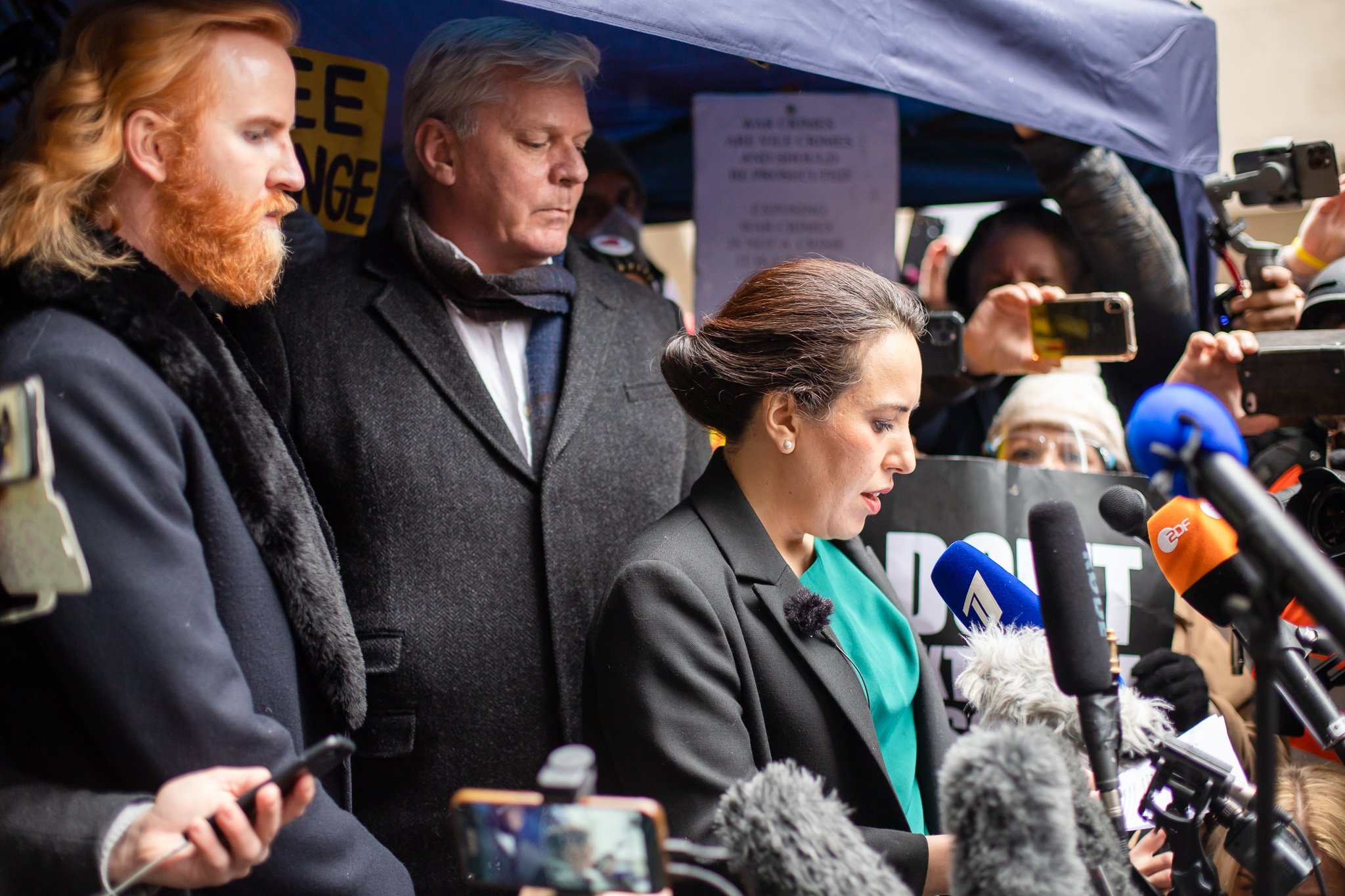United Kingdom/USA: PEN International welcomes the decision not to extradite Julian Assange, yet the threat to media freedom remains
Julian Assange’s fiancée, Stella Moris, speaking on news of the decision not to extradite, photo credit Jason Garcia.
Update - 6 January 2021
The refusal to grant bail to Julian Assange on 6 January 2021 while he awaits the outcome of the prosecution appeal is a continuation of the harsh treatment that he has endured since he entered the UK’s Belmarsh High Security Prison in April 2019. This especially so in light of his poor mental health. Following a visit to Assange at the prison in November 2020, the UN Special Rapporteur on Torture expressed alarm about his state of health that showed “all the symptoms typical for prolonged exposure to psychological torture”. PEN International continues to call for the dropping of the extradition order, and with it the threat to media freedom in general. Furthermore, Julian Assange must be released pending the outcome of the appeal.
The news today, 4 January 2021, of the decision not to extradite WikiLeaks founder and publisher Julian Assange to the USA is hugely welcome. The judge’s decision was made on medical grounds relating to Assange’s poor mental health. She did, however, make clear her view that there are otherwise grounds for the extradition request. The threat to freedom of the media and to investigative journalism therefore remains. The US government has 14 days to submit an appeal the court’s ruling, and Assange will remain detained at least until his bail hearing scheduled for 6 January.
PEN International calls for the withdrawal of the extradition request by the US government against Julian Assange. It also urges the UK courts not to accede to the demand to extradite Assange when it comes to appeal. Meanwhile, Julian Assange should be granted release from prison as a matter of urgency.
Assange has been held since April 2019 in the UK’s Belmarsh High Security Prison for breaching the UK Bail Act. He had taken refuge in the Ecuadorian embassy in London in 2012 to avoid extradition to Sweden. That he has been detained for so long under strict conditions in a high security prison without reasonable grounds and places his health at risk, demands that he be granted compensation for this unnecessary internment.
In May 2019, Julian Assange was indicted by the US Justice Department on 17 counts of violating the US Espionage Act for his role in obtaining and publishing classified military and diplomatic documents in 2010. He was additionally charged on one count of conspiracy to commit computer intrusion. UN experts, free expression groups and scores of human rights lawyers have made it clear that this prosecution raises profound concerns about freedom of the press under the First Amendment to the US Constitution and sends a dangerous signal to journalists and publishers worldwide, raising the possibility of legitimate news-gathering activities being criminalised. Through WikiLeaks, Julian Assange published classified material provided by whistle-blower Chelsea Manning, then a military analyst in the US army, which revealed evidence of human rights violations and possible war crimes committed by the US military in Iraq and Afghanistan. US prosecutors criticized Julian Assange for putting the identity of sources at risk by publishing unredacted materials.
If Assange were to be convicted as charged, this would open the door for further prosecutions of those who seek to disclose malpractice and human rights abuses by those in power by criminalising legitimate journalistic practice. In essence these practices are a) encouraging sources to provide information, b) protecting their anonymity and c) using secure means of communications.
The US Espionage act of 1917 was designed to punish spies and traitors working with foreign governments during wartime. Using it to sentence Chelsea Manning to 35 years in prison was in itself a threat to critical publishing. Manning, it should be noted, has since been pardoned. The fact that Julian Assange could face decades behind bars would cause a chilling effect on critical journalism seeking to expose the truth about crimes committed by governments. The fact that a government decides that a specific document is secret or confidential does not make it so, and on many occasions the public's right to know overrides the state’s desire to keep matters secret, such as evidence of human rights violations or corruption.
PEN International
English PEN
PEN Norway
For more information, please contact Sara Whyatt, Europe Programme Coordinator, at PEN International, Koops Mill Mews, Unit A, 162-164 Abbey St, London, SE1 2AN, Tel.+ 44 (0) 20 7405 0338, email: [email protected]
Note to editors:
PEN International promotes literature and freedom of expression and is governed by the PEN Charter and the principles it embodies: unhampered transmission of thought within each nation and between all nations. Founded in London in 1921, PEN International – PEN’s Secretariat – connects an international community of writers. It is a forum where writers meet freely to discuss their work; it is also a voice speaking out for writers silenced in their own countries. Through Centres in over 100 countries, PEN operates on five continents. PEN International is a non-political organisation which holds Special Consultative Status at the UN and Associate Status at UNESCO. PEN International is a registered charity in England and Wales with registration number 1117088

